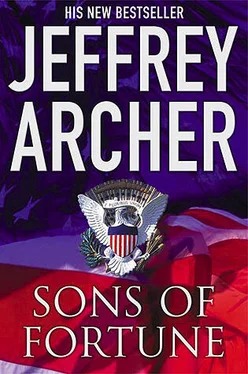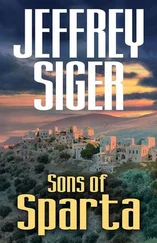‘Over to your right,’ shouted Nat as he spotted a clearing in the forest.
‘I see it,’ said the pilot as he tried to swing the helicopter towards the open space, but the three-ton juggernaut just wouldn’t respond. ‘We’re going down, whether we like it or not.’
Nat thought of his mother and felt guilty that he hadn’t replied to her latest letter, and then of his father, who he knew would be so proud of him, of Tom and his triumph of being elected to the Yale student council — would he in time become president? And of Rebecca, whom he still loved and feared he always would. As he clung to the floor, Nat suddenly felt very young; he was, after all, still only nineteen. He discovered some time later that the flight lieutenant, known as Blackbird Twelve, was only a year older.
As the helicopter blades stopped whirring and the aircraft plummeted towards the trees, the staff sergeant spoke, ‘Just in case we don’t meet again, sir, my name’s Speck Foreman, it’s been an honour to know you.’
They shook hands, as one does at the end of any game.
Fletcher stared at the picture of Nat on the front page of the New York Times below the headline ‘AN AMERICAN HERO‘. A man who had signed up the moment he’d received the draft notice, although he could have cited three different reasons for claiming exemption. He’d been promoted to lieutenant and later, as a requisition officer, he’d taken command of an operation to rescue a stranded platoon on the wrong side of the Dyng River. No one seemed to be able to explain what a requisition officer was doing on a helicopter during a front-line operation.
Fletcher knew he would spend the rest of his life wondering what decision he would have made if that buff envelope had ended up in his mailbox, a question that could only be properly answered by those who had been put to the test. But even Jimmy conceded that Lieutenant Cartwright must have been a remarkable man. ‘If this had happened a week before the vote,’ he told Fletcher, ‘you might even have beaten Tom Russell — it’s all in the timing.’
‘No, I wouldn’t,’ said Fletcher.
‘Why not?’ asked Jimmy.
‘That’s the weird thing,’ Fletcher replied. ‘He turns out to be Tom’s closest friend.’
A fleet of eleven helicopters had returned to search for the missing men, but all they could come up with a week later were the remains of an aircraft that must have exploded the moment it hit the trees. Three bodies had been identified, one of them Flight Lieutenant Carl Mould’s, but despite an extensive search of the area, no trace could be found of Lieutenant Cartwright or Staff Sergeant Speck Foreman.
Henry Kissinger, the national security advisor, asked the nation to both mourn and honour men who exemplified the courage of every fighting soldier at the front.
‘He shouldn’t have said mourn,’ remarked Fletcher.
‘Why not?’ asked Jimmy.
‘Because Cartwright’s still alive.’
‘What makes you so sure of that?’
‘I don’t know how I know,’ Fletcher replied, ‘but I promise you, he’s still alive.’
Nat couldn’t recall hitting the trees, or being thrown from the helicopter. When he eventually woke, the blazing sun was burning down on his parched face. He lay there, wondering where he was, and then the memory of that dramatic hour came flooding back.
For a moment a man who wasn’t even sure there was a God prayed. Then he raised his right arm. It moved like an arm should move, so he wiggled the fingers, all five of them. He lowered the arm and raised the left one. It too obeyed the telegraphed message from his brain, so he wiggled his fingers and, once again, all five of them responded. He lowered the arm and waited. He slowly raised his right leg and carried out the same exercise with the toes. He lowered the leg before raising the other one, and that’s when he felt the pain.
He turned his head from side to side, and then placed the palms of his hands on the ground. He prayed again and pressed down on his hands to push himself giddily up. He waited for a few moments in the hope that the trees would stop spinning, and then tried to stand. Once he was on his feet he tentatively placed one foot in front of the other, as a child would do, and as he didn’t fall over, he tried to move the other one in the same direction. Yes, yes, yes, thank you, yes, and then he felt the pain again, almost as if until that moment he had been anaesthetized.
He fell to his knees, and examined the calf of his left leg where the bullet had torn straight through. Ants were crawling in and out of the wound, oblivious to the fact that this human thought he was still alive. It took Nat some time to remove them one by one, before binding his leg with a sleeve of his shirt. He looked up to see the sun retreating towards the hills. He only had a short time to discover if any of his colleagues had survived.
He stood and turned a complete circle, only stopping when he spotted smoke coming from the forest. He began to limp towards it, vomiting when he stumbled across the charred body of the young pilot, whose name he didn’t know, the jacket of his uniform hanging from a branch. Only the lieutenant’s bars on his epaulette indicated who it had been. Nat would bury him later, but for now he had a race with the sun. It was then that he heard the groan.
‘Where are you?’ shouted Nat. The groan went up a decibel. Nat swung round to see the massive frame of Staff Sergeant Foreman lodged in the trees, only a few feet above the wreckage. As he reached the man, the groan rose yet another decibel. ‘Can you hear me?’ asked Nat. The man opened and closed his eyes as Nat lowered him on to the ground. He heard himself saying, ‘Don’t worry, I’ll get you home,’ like some schoolboy hero from the pages of a comic book. Nat removed the compass from the staff sergeant’s belt, looked up at the sun, and then he spotted an object in the trees. He would have cheered if only he could have thought of some way of retrieving it. Nat dragged himself over to the base of the tree. He somehow jumped up and down on one foot as he grabbed at a branch and shook it, hoping to dislodge its load. He was about to give up when it shifted an inch. He tugged at the branch even more vigorously, and then it moved again and suddenly, without warning, came crashing down. It would have landed on Nat’s head if he hadn’t quickly fallen to one side. He couldn’t jump.
Nat rested for a moment, before slowly lifting the staff sergeant up and gently placing him on the stretcher. He then sat on the ground and watched the sun disappear behind the highest tree, having completed its duty for the day in that particular land.
He had read somewhere about a mother who had kept her child alive after a car crash by talking to him all through the night. Nat talked to the staff sergeant all night.
Fletcher read in sheer disbelief how, with the help of local peasants, Lieutenant Nat Cartwright had dragged that stretcher from village to village for two hundred and eleven miles, and seen the sun rise and fall seventeen times before he reached the outskirts of the city of Saigon, where both men were rushed to the nearest field hospital.
Staff Sergeant Speck Foreman died three days later, never discovering the name of the lieutenant who had rescued him and who was now fighting for his own life.
Fletcher followed every snippet of news he could find about Lieutenant Cartwright, never doubting he would live.
A week later they flew Nat to Camp Zama in Japan, where they operated on him to save his leg. The following month he was allowed to return home to the Walter Reed Army Medical Center in Washington DC to complete his recuperation.
The next time Fletcher saw Nat Cartwright was on the front page of the New York Times, shaking hands with President Nixon in the Rose Garden at the White House.
Читать дальше












